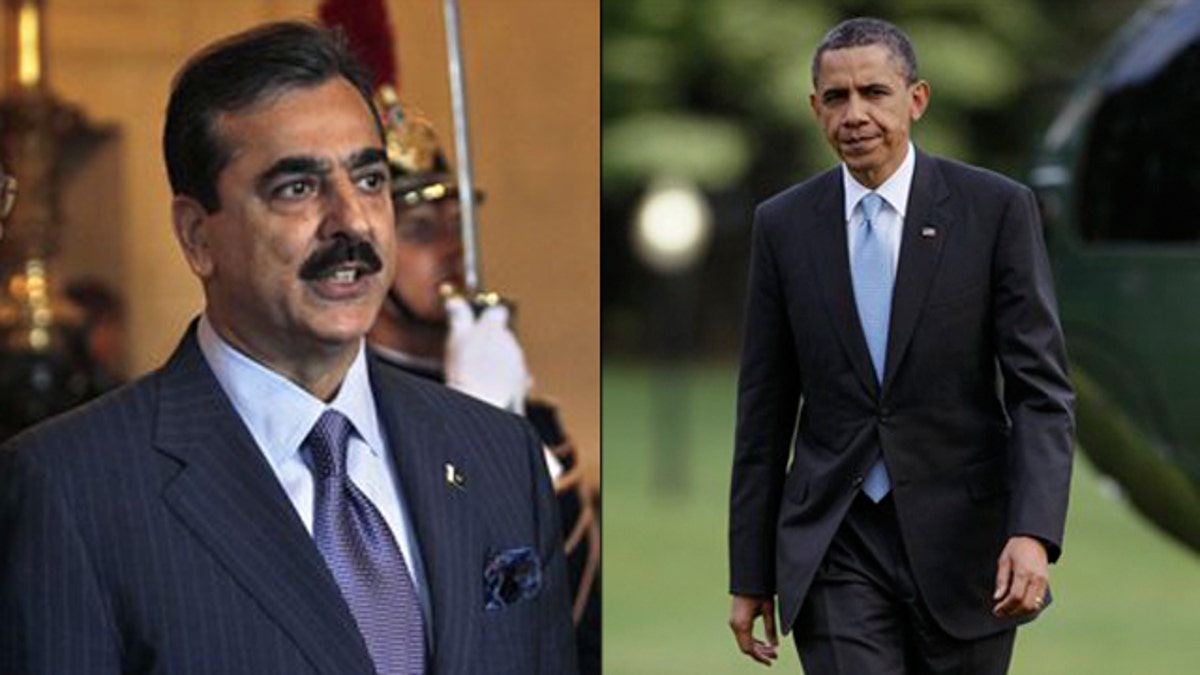
Shown here are President Obama, right, and Pakistani Prime Minister Yousuf Raza Gilani, left. (AP)
Pakistan's prime minister warned the United States Monday that his country could respond to any future U.S. raids on its soil with "full force," in the latest escalation of rhetoric in the wake of Usama bin Laden's death.
Pakistani Prime Minister Yousuf Raza Gilani, like other officials in Islamabad, said the killing of bin Laden in northern Pakistan was a positive step. But, reflecting concerns that the unilateral strike violated his country's sovereignty, Gilani sent a clear message to the United States. He warned any "overt or covert" attack would be met with a "matching response" in the future.
"Pakistan reserves the right to retaliate with full force. No one should underestimate the resolve and capability of our nation and armed forces to defend our sacred homeland," Gilani said.
Pakistani officials are taking a firm stance on the raid, as the United States analyzes the trove of evidence collected from the bin Laden compound. That evidence -- described as the largest intelligence find ever from a senior terror leader -- could lead the United States to other terrorists on Pakistani soil, once again forcing President Obama to decide whether to go around the Pakistanis to capture or kill a high-value terror target.
White House Press Secretary Jay Carney has said the president reserves the right to enter Pakistani territory to act against terror suspects if Pakistan will not, and reiterated that message when asked about Gilani's speech. He said Monday that while the U.S. takes Pakistanis' concerns seriously, the U.S. does "not apologize" for the raid.
"It's simply beyond doubt in his mind that he had the right and the imperative to do this," Carney said Monday.
With analysts combing through the bin Laden files for clues on the whereabouts of Al Qaeda's Ayman al-Zawahiri or Taliban chief Mullah Omar, some are calling on Obama to strike again while Al Qaeda and its allies are staggering.
"We have no right to keep our troops on the defense dying, when we know where some of the highest-ranking people in the Taliban are," Bing West, former assistant defense secretary, told Fox News on Monday.
Former CIA Director Michael Hayden said that if the U.S. gets bin Laden's deputy -- presumed to be al-Zawahiri -- in its sights, "the same calculus" that was used on bin Laden should apply.
But the thought already has Pakistani leaders fuming.
Husain Haqqani, Pakistan's ambassador to the U.S., told ABC's "This Week" that the Pakistani government wants to continue "joint operations," but is concerned about the nature of the raid last weekend.
"Nobody said that we didn't want Usama bin Laden taken out. What we are offended by is the violation of our sovereignty," he said. "Now, we've heard the American explanation. But at the same time, try and put yourself in the position of a Pakistani leader who has to go to votes from the same people who will turn around and say, 'You know what? You can't protect this country from American helicopters coming in.'"
U.S. officials have made clear that they did not loop in the Pakistanis on the raid out of concern that somebody would tip off bin Laden.
Asked about the Pakistanis' concerns, Carney said repeatedly Monday that the U.S. continues to view its relationship with the country as "important."
Obama, in an interview with CBS' "60 Minutes," confirmed that he did not inform Pakistani officials of the raid in advance, though he praised Pakistan's cooperation considering "we've been able to kill more terrorists on Pakistani soil than just about any place else."
However, Obama also questioned whether anybody inside the Pakistani government might have known about bin Laden's location all along.
"We were surprised that he could maintain a compound like that for that long without there being a tip-off," Obama said. "We think that there had to be some sort of support network for bin Laden inside of Pakistan. But we don't know who or what that support network was. We don't know whether there might have been some people inside of government, people outside of government, and that's something that we have to investigate and, more importantly, the Pakistani government has to investigate."




